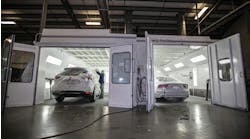How COVID-19 has created just the latest challenge for the automotive aftermarket
Everyone is aware that vehicle technology and business trends are moving forward at a constant pace. Things are changing so fast, in fact, that many automotive repair shops have had to devise strategies to help them keep up.
The same can be said for the jobber business, where electrification, alternate fuels and vehicle automation are causing incredible parts proliferation, forcing stores to rethink their approaches to inventory management and customer service.
Technological advances will continue to change the dynamics, look and day-to-day operation of aftermarket businesses. To succeed, repair shops and parts stores alike must have a plan for adapting to the latest developments.
But no one anticipated the kind of rapid and revolutionary changes that a global pandemic would bring. COVID-19 forced overnight changes at the shop and jobber level – prompting a complete realignment of business priorities faster than new technology ever could.
In the past few months, we’ve seen a complete redesign of the consumer experience at repair and service shops:
- Touchless drop-off of vehicles
- Vehicle pick-up and drop-off at client homes and businesses
- Fewer chances to chat with clients face to face
- The complete sanitization of keys and vehicles before they come into the bay
- A second sanitization before these are returned to the client
- Complete rearrangement of the shop interior to ensure physical distancing
- Extensive use of personal protective equipment by staff
- Thorough and frequent cleaning of public areas, surfaces, and hands
- Potential deterioration in staff morale as employees try to maintain productivity while being distracted by concerns for their own families; and, looming over everything
- The consequences to the shop if even one staff member is infected with COVID-19
These issues are stressful to shop owners across the country. Given the situation, it would be understandable if relations with suppliers are occasionally strained or tempers occasionally flare. Shops have had to start working in “emergency mode.”
Managers and owners should bear in mind, however, that jobbers are also facing market uncertainties, and have had to retrain their staff and reassess their protocols in order to meet the needs of their clients.
Among the challenges they’ve faced in recent months:
- Shops that insist parts are dropped off outside the shop, in a secure but touchless way
- Confirming that all deliveries are made to the client’s satisfaction with minimal face-to-face contact
- Operating a staff that still has to venture out into the field for sales and detailing visits in a time of social distancing
- Keeping counter teams safe and informed about COVID-19 transmission
- Maintaining the trust of wholesale clients when low-grade paranoia about health safety infects every personal interaction.
COVID-19 has brought an incredible level of complexity to routine transactions.
As stress levels rise, let’s all take a deep breath, acknowledge what an unusual situation we find ourselves in, and calmly consider the best path forward.
Jobbers might want to ask themselves what they offer their best customers that other jobbers don’t or simply can’t offer. Understanding their clients’ businesses, of course, is key to meeting needs. Do they fully grasp each shop’s circumstances and vision? Can they offer competitive advantages to help client businesses grow profitably?
Meanwhile, shops need to redefine the added value they bring to their clients. What makes them the best service outlet for their customers’ vehicles?
Professional shops and jobber businesses want to do business that offers clear profitability, not just volume sales. That is true today, and will probably be even truer tomorrow. Our industry is getting too complicated to rely on low-margin sales. This only creates volume, not profit. Everyone ends up working too hard for very little money.
In repair shops and jobber stores alike, we want to work smarter. Relying on the way things have always been done in the past is a recipe to failure.
COVID-19 has shown all of us how fast business conditions can change. Look at the fantastic response you’ve done of negotiating these difficult times. Now apply the same kind of ambition and innovation to the other challenges in our industry.
Change is not an option. Today’s entrepreneurship and leadership will help you capture tomorrow’s business. Failure to change is not an alternative.



